Uganda Elections: Museveni Vs People Power
Unless it’s a surprise, the incumbent President Yoweri Museveni, who has been in power for nearly four decades, should win yesterday's presidential election opposing him to 10 other candidates following a campaign marked by several violent incidents including the killing of over 50 civilians, human right abuses, restrictions to access media and people and arrests of his main challenger, Robert Kyagulanyi, popularly known as Bobby Wine.
It is hard to tell whether Uganda’s 2021 presidential election and results would be enough free and fair to meet international democratic standards given the numerous controversies and violent incidents that have characterized the electoral campaign. However, it’s clear that President Museveni and his base have increased control over the entire country ahead of the polls.
Earlier last week, he ordered the suspension of all social media platforms, accusing them of ‘arrogance’ after some of his closest allies witnessed the shut down of their Facebook and Twitter accounts. Heavily armed police and army officers were seen patrolling in the streets of Kampala on Tuesday and Wednesday. President Yoweri Museveni’s growing authoritarianism has been visible through the regular blockades and repression of the opposition campaigning activities, attacks on the press, and arrest of activists. Asked by CNN why the army and police are interfering in Bobi Wine’s campaign rallies, the President said that the opposition leader ‘has been violating health measures during the pandemic’. Interestingly, President Museveni himself has been campaigning without respecting the social distancing measures.
Confronted with several challenges, including high unemployment rates among the youths, rampant corruption, weak institutions, growing dissatisfaction of the people, uncertain political succession, and the economic recession caused by the covid-19 pandemic, President Museveni has opted for violent repression and silencing all opposition’s voices. He has increased the budget of military and security sectors at the expense of social ones and the brutality of security forces is fostering discontent especially among the urban youths and marginalised communities.
Among those, let’s take a look at the affected communities from Western Uganda where the oil exploration and exploitation activities are expected to cause large-scale displacement of communities and pose grave risks to protected environments, water sources, and wetlands. According to a report released last October by partner organisations Friends of the Earth France and Survie, the Tilenga (oil extraction in the heart of a protected natural area) and EACOP (the East African Crude Oil Pipeline, a proposed 1,445-kilometer pipeline from Hoima, Uganda to the port of Tanga in Tanzania) projects led by the French giant Total are causing massive population displacements in Uganda and Tanzania. Tens of thousands of people are totally or partially deprived of their land, even before receiving any compensation. Testimonies collected in the various Ugandan districts affected by these two projects reveal high levels of school dropouts among children, a situation of famine, loss of livelihoods, and lack of proper and fair compensation.
Whether Museveni wins the presidential election or not, the newly elected leadership should swiftly prevent Uganda from falling into a prolonged period of uncertainty. Though the country is not in danger of a civil war, the recent incidents and tensions have shown signs of sliding into a political and economic crisis that could eventually threaten Uganda’s stability as well as the entire region.
Ugandans in their diversity aspire not only for a peaceful and prosperous country but also for fairness, democracy, rule of law where every citizen is respected regardless of political affiliations. Officials involved in political and economic crimes should be removed and prosecuted. The controversial Tilenga and EACOP projects due to enrich a handful of politicians and multinationals should stop immediately and people’s rights be restored. Those would be the first signs of real change that Ugandans can achieve through a process of social transformation and democratic transition that bravely address the real issues their society faces.
The 5th anniversary of the Paris Agreement and what it means for Tanzania
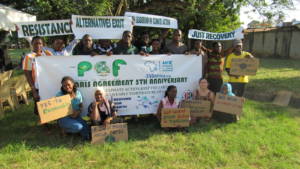
On the 19th of December, after the anniversary, Partnership for Green Future mobilized University students to ensure the youths' voice on climate change from different faiths are given space to advocate for clean energy and a future they can rely on. The main goal of the event was to bring together young people in the climate movement to mark the 5th anniversary of the Paris Agreement and call on the government to demonstrate real climate leadership to stay within 1.5 by keeping fossil fuels on the ground and not funding their infrastructure.
The event was attended by the students of University of Dar es Salaam, Climate Action Network Tanzania, Climate Science community and TAJPI. Other participants included Dar es Salaam University Student Organization (DARUSO), Association of Students from Geography and Environmental Studies (AGEM), University of Dar es Salaam Association for Wildlife and Conservation (UDAWICOSA), Earth day and Go Green.
Key moments
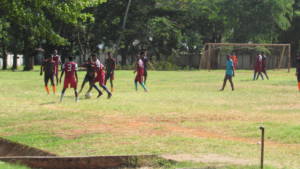

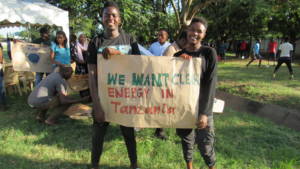
- Sports: The event started with sports, basketball and football, which took place at Mabibo Hostel grounds. Sports is considered as a good strategy of mobilization in Tanzania.
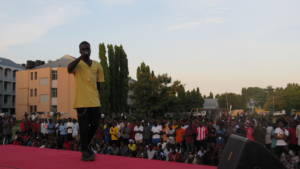
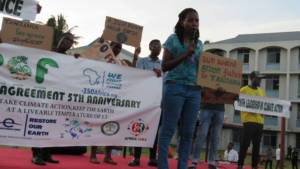
- Talent show and short messages:
After the sports, some of the students showed their talents by singing in different styles focusing on themes about tackling the effects of climate change and the role of youth in climate action. There was also a performance of various written messages that were displayed and delivered verbally.
The Main Speech: Ms. Rehema Peter, the host of the event, shared information with guests and participants on the real challenges Tanzania is facing due to climate change. "Dar es Salaam has become the hottest city in East Africa and people are still ignorant of the cause". She also raised an alarm about the development of the East Africa Crude Oil Pipeline (EACOP) which is going to put Tanzania at high risk. She called for University students and other stakeholders to use all channels to advocate for a Fossil Free Tanzania and for the Government to keep fossil fuels in the ground. There was also a special moment to share the message with all the students gathered, and to remind them that they are the voice of change. East Africa Radio from Dar es Salaam covered the event, taking the message of the day to be aired and published, and promised a platform for climate action. Different young people at University were recorded with various messages calling for clear action towards a just recovery ahead of COP 26.
The students emphasized the need to be empowered on issues related to fossil fuels and strategies so as to build a successful climate movement. "We appreciate each and everybody who made this event a success, especially the support from 350 Africa and we cannot wait to change the tide in our beloved country."
By Rehema Peter, founder of Partnership for Green Future
GIFSEP Empowers Environmental Stewards in Secondary Schools in Nigeria
“Good habits formed at youth make the difference” - Aristotle.
In recognition of this, the Global Initiative for Food Security and Ecosystem Preservation (GIFSEP) is undertaking a project targeted at building the capacity of students and teachers to address Climate Change primarily by promoting environmental stewardship through behavioural change and skills in renewable energy and waste management.
The Project whose implementation began in November 2017 targets Senior Secondary Schools in the Federal Capital Territory (FCT), Nigeria. It is being implemented under the supervision of the FCT Secondary Education Board and funded by the United Nations Development Programme's Global Environmental Facility Small Grants Programme.
Thus far, activities carried out have included training workshops and school visitations.
The project has equipped students and teachers through numerous trainings on climate change, renewable energy and waste management to address environmental challenges. Through our support, the students have been able to establish environmental clubs in their schools which now serves as the primary vehicle for taking climate action in their respective schools. The Capacity Building of Students to address climate change project, has received numerous positive commendations from the Secondary Education Board, FCT Schools management, teachers and students and more. Consequently, the project has been able to secure the commitment of teachers to raise a generation of green champions in their schools. Also, the students have pledged to the good environmental stewards.
Only recently, the GIFSEP team visited schools in FCT-Nigeria to officially establish new environmental clubs in Schools while also encouraging pre-existing environmental clubs to continue to take definite climate action. Overall, the students, teachers and the school management show great enthusiasm towards the project and have all committed to be ambassadors of the environment.
As a team, we are glad that we were able to put smiles on the faces of students and teachers this year in spite of the many challenges that came along with the COVID-19 pandemic.
By Ogho Udoko and Joseph Ibrahim
GIFSEP, Global Initiative on Food and Ecosytem Preservation
Interfaith Poetic Youth Forum Event - 12 December 2020
On that day, the office of Justice Peace and Integrity of Creation Franciscans Africa mobilized schools for the climate in a virtual poetic forum. Interfaith youth forum is always an important platform for us because it gives space to young people from different faiths to advocate for clean energy. The main goal of the event was to bring together young people in the climate movement to mark the 5th anniversary of the Paris Agreement and call on the government to demonstrate real climate leadership to stay within 1.5 by keeping it in the ground and not funding fossil fuels.
Ghana’s fight against coal inspired the rest of Africa
Ezekiel Chibeze, 350 Ghana Reduce Our Carbon (GROC) co-founder and leader of Strategic Youth Network for Development is among the six grassroots environmental activists that were announced on Monday as winners of the 2020 Goldman Environmental Prize for leading a vibrant grassroots campaign aimed at cancelling the construction of the first coal-fired power plant in Ghana and to accelerate the country energy transition to renewables.
This prestigious award comes as a recognition of tireless efforts and intense campaigning work that Chibeze and his colleagues have made since we first met in 2013. Back then, the team of seven young environmental activists were trained at Global Power Shift Summit by 350.org along with 500 young activists from all over in creative and ambitious climate campaigning.
Back home, 350 GROC along with other civil society groups embarked on a struggle against the proposed 700 MW coal plant in the region of Ekumfi, warning about the dangers of coal plants, stressing its very serious health and environmental impacts and exposing the lies and contradictions spread by the proponents. The project was then proposed as a response to the power outages that had become so frequent, paralyzing businesses and affecting people's well-being across Ghana.
Between 2014 and 2015, 350 GROC and allies went on the ground mobilising and raising awareness of youths in schools, students, community and religious leaders on the dangerous impacts of coal on human life, natural habitats and ecosystems at large. The campaigners led by Chibeze also sent many letters to banks and government institutions. The lack of response from those institutions was already an eloquent sign that the arguments put forward by civil society groups were extremely solid, unbeatable.
In October 2015, I visited GROC for a strategy workshop aimed at reviewing and consolidating the anti-coal struggle. During the discussion, Farid Shamsu Deen, one of the GROC members asked “Why should we accept Shenzhen Energy Group, a company that has been chased out in its own country (China) to flourish in Ghana while impacting negatively on our communities, our health, our water and air?” That comment showed the team’s resolution to spare no effort until this coal dream is abandoned.
In late 2016, Ghana's environment minister said the coal plant would not move forward, and a few months later, the new president announced that all new power projects would be renewable energy-based.
The cancellation of what would have been Ghana's first coal-fired power plant has sparked a wave of anti-coal struggles across the continent - from Senegal to Kenya, from Zimbabwe, to Cote d'Ivoire and South Africa where activists are fighting alongside the affected communities to stop the construction of new plants and the phasing out of existing ones.
The Ghanaian campaigning model is an excellent combination of ‘classic’ tactics of mobilising and engaging grassroots communities with ‘modern’ ones related to lobbying, advocacy and communication through social media platforms. It confirmed once again the immense power of united forces and voices and the effectiveness of grassroots advocacy to achieve systemic change.
Ezekiel’s recognition with the Goldman Environmental Prize 2020 shows that collective efforts through community organizing and campaigning can empower ordinary people to demand their rights and overcome social injustices and achieve inspiring wins for thousands of grassroots activists, frontline communities, and local groups of Africa and beyond working for real climate justice. If a group of seven volunteers compelled their government to cancel what would have been the country's first coal-fired power plant, what couldn’t we achieve as national coalitions, regional and global movements working hand-in-hand for a fossil-free planet?
Ghanaian environmentalist wins the 2020 Goldman Environmental Prize
Press Release:

Global -- Ezekiel Chibeze, a Ghanaian environmental champion has been announced as the recipient of the Goldman Environmental Prize 2020, citing his commitment to pushing for good governance in Ghana’s environmental sector and for his climate leadership in Ghana, across Africa and globally. The Goldman Environmental Prize is the world’s foremost award honoring grassroots environmental activists.
Chibeze joins an illustrious list of past Goldman Environmental Prize winners from the African continent including Wangari Maathai, renowned Kenyan social, environmental and political activist; Ken Saro-Wiwa, Nigerian writer who fought for environmental justice and human rights; and recently South African activists Makoma Lekalakala and Liz McDaid.
Through the 350 Ghana Reducing our Carbon (G-ROC), the leading environmental grassroots organization in Ghana affiliated to 350.org, Chibeze champions for climate justice, fighting tirelessly to stop the Ekumfi proposed coal plant while raising awareness about the possibility of a carbon-free future and the potential of renewable energy in Ghana. Chibeze’s work demonstrates the power of grassroots movements in ending the era of fossil fuels.
Quotes from key spokespeople
“We at 350 are in awe of Chibeze’s achievements. His work pushing for a sustainable, resilient, and coal-free Ghana is admirable, more than deserves the global recognition it has just received. The climate crisis requires us to interrogate the key drivers of climate change, especially the negative effects of the fossil fuels industry. People like Chibeze, who organise and motivate grassroots movements seeking to bring lasting solutions to the climate crisis, are our true climate leaders, and are instrumental to this fight. We honor their dedication and commitment to the planet.” - May Boeve, Executive Director, 350.org
“Africa's youth have been calling for climate justice that would see a transition from fossil fuels and building climate resilient economies powered by renewables. This is exactly what Chibeze and the G-ROC team have been fighting for. As a climate leader, Chibeze has shone a spotlight on the climate crisis while helping his country, Ghana to think of a socially and environmentally just, zero carbon future. Chibeze has been a strong voice of the youth and grassroots groups. The recognition of his and other allies' work shows that collective efforts through community organising and campaigning can empower ordinary people to demand their rights and overcome social injustices and achieve inspiring wins for thousands of grassroots activists, frontline communities and local groups of Africa and beyond working for real climate justice.” - Landry Ninteretse, Africa Team Leader, 350.org
For additional information and interviews, contact: Robert Magori robert.magori@350.org, +254 721 525344 or Chibeze Ezekiel chibeze@gmail.com,+233 244967931 or Portia Adu Mensah 350groc@gmail.com, +233 262685618
About the Goldman Environmental Prize
The Goldman Environmental Prize honors grassroots environmental heroes from roughly the world’s six inhabited continental regions: Africa, Asia, Europe, Islands & Island Nations, North America, and South & Central America. The Prize recognizes individuals for sustained and significant efforts to protect and enhance the natural environment, often at great personal risk. The Goldman Prize views “grassroots” leaders as those involved in local efforts, where positive change is created through community or citizen participation. Through recognizing these individual leaders, the Prize seeks to inspire other ordinary people to take extraordinary actions to protect the natural world. For more information visit: https://www.goldmanprize.org/.
About Ezekiel Chibeze
Chibeze is an avid environmentalist who serves on a number of platforms providing support in promoting good governance in Ghana’s environmental sector – specifically on climate change, biological diversity, forestry, and renewable energy. He is currently the Executive Coordinator of the Strategic Youth Network for Development (SYND), a youth-oriented organization which promotes youth inclusion in the governance of natural resources and the environment. He is a certified Youth Master Trainer on Climate Change and a National SDGs Champion. He is a co-founder of 350 Ghana Reducing our Carbon (G-ROC), a convener of the Youth in Natural Resources and Environmental Governance (Youth-NREG) Platform, a member of the national technical committee of Ghana’s SDGs Governance Framework, and a board member of 350.org.
GE's withdrawal from coal is a step towards a new fossil free era
By Omar Elmawi and Landry Ninteretse*
General Electric (GE), one of the world's largest makers of coal-fired power plants recently announced the company’s intentions to not build any new coal plants. Would this be signaling the final stroke for numerous coal projects across Asia and Africa?
In its statement, GE was categorical to say that it will “continue to focus on and invest in its core renewable energy and power generation businesses, working to make electricity more affordable, reliable, accessible, and sustainable.” However, the exit plan and timeline for existing nuclear and coal power plants are not fully clear as GE has indicated its intention to continue working with customers on existing obligations as it pursues this exit.
This could set the precedent for continued work on projects such as the highly contentious 1,050-megawatt Lamu coal-fired power plant, which GE agreed to design, construct and maintain in May 2018, along with Amu Power. Estimated at $2 billion, the cost of the power plant is by no means negligible. That said, there is still a long way for GE to ensure that the company fully exits the 17 coal power stations it is trying to equip worldwide.
Towards the cancellation of the Lamu project?
The withdrawal of GE represents a blow to Amu power, which has refused to comment on the decision. It comes less than a year after the African Development Bank (AfDB) indicated that it will not fund the coal-fired power plant project in Kenya and that it is withdrawing from financing any coal project on the content. It also comes after this project was halted by a local environmental court, a decision which gave immense hope to the communities which have struggled for years to protect their livelihoods and the socio-cultural heritage of Lamu, a UNESCO heritage site.
GE had come under severe criticism in 2018 after revelations of its involvement in the construction of the Lamu coal plant. Local communities and groups sent a correspondence to the American company asking them to withdraw from the project unconditionally. In its response in February 2019, GE denied its involvement in the project, indicating that it has no ownership interest in the Lamu coal plant. This statement came amidst media reports quoting the CEO of Amu Power expressing his satisfaction at signing a cooperation agreement with GE on the Lamu power facility.
This lack of transparency and continued support of fossil fuel projects saw GE facing mounting pressure from investors and environmental watchdogs to switch to more environmentally sustainable projects. Earlier this year, a coalition of 65 civil society groups from 16 countries where GE is expanding coal signed a letter requesting GE to get out of coal immediately. It was a strong sign that the people from countries like Bangladesh, Indonesia, Mozambique, Turkey, Pakistan, Philippines, South Africa and Tanzania have rejected GE’s rampant coal expansion estimated at 15GW of new coal power.
The potential of Renewable Energy gives a glimpse of the future
More and more financiers are increasingly skeptical of the idea of financing coal projects, especially in Africa and Asia. Last week, The International Finance Corporation (IFC), the World Bank’s private-sector arm which owns equity stakes in many large commercial banks in emerging markets, introduced new climate change conditions for its investments in commercial banks to encourage the lenders to wind down support for coal projects in African, South Asian and South American countries.
This growing ecological awareness and increased moral responsibility among the banking community has led to the upcoming Finance in Common (FIC) Summit, which will bring together for the first time 450 Public Development Banks and Development Finance Institutions from around the world to discuss the alignment of its policies with climate and sustainable development goals. It is hoped that this Summit will finally put people and the planet at the centre of development by bringing greater scrutiny to fossil fuel financing across the world. Civil society from all over the globe is keen to see a joint declaration that puts more restrictions to finance for coal, oil and gas.
GE’s announcement is a step in the right direction but a lot more needs to be done to ensure that the company is firmly on a low-carbon trajectory. GE has the potential to lead the way in renewable energy technology development, and last year’s launch of the world’s largest wind turbine Haliade-X is a demonstration of this potential. However, GE needs to listen to concerns from investors, scientists, climate experts and society, and completely dump its fossil fuel past, focusing on a more just, greener and cleaner future we all deserve.
*Omar Elmawi is the Campaign Coordinator for deCOALonize in Lamu, Kenya and Landry Ninteretse is the Africa Team Leader of 350.org

